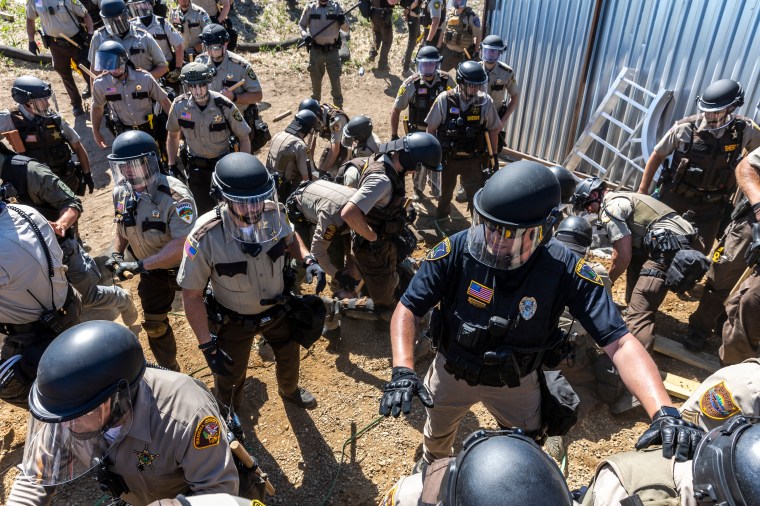Washington, D.C., June 11, 2021 — Authorities in Minnesota’s Hubbard County should explain their reasoning for detaining and strip-searching journalist Alan Weisman and drop all charges against him, the Committee to Protect Journalists said today.
At about 5 p.m. on June 7, an officer with the local sheriff’s department in Hubbard County, Minnesota, arrested Weisman, a freelance journalist on assignment for the Los Angeles Times,while he was covering a protest against the construction of an oil pipeline, according to the journalist, who spoke to CPJ in a phone interview.
The deputies brought Weisman to the local sheriff’s department, where officers strip-searched him and confiscated his phone, voice recorder, notebooks, and prescription medications, he said. He told CPJ that authorities released him at about 9:30 p.m., returned his possessions, and did not inform him of any charges filed against him.
In a phone interview today, Hubbard County Attorney Jonathan Frieden told CPJ that his office had filed gross misdemeanor trespassing charges against Weisman, but said that the charges had not been formally approved by a judge as of today. He said he was not aware that Weisman was a journalist at the time his office filed the charges, but added that Minnesota state law does not provide special dispensation for journalists in such cases.
Under Minnesota law, the maximum fine that can be imposed for a gross misdemeanor is $3,000.
Law enforcement have recently arrested about 250 people on trespassing, public nuisance, and unlawful assembly charges in relation to the protest, according to news reports.
“It is outrageous that officers from Minnesota’s Hubbard County Sheriff’s Department held journalist Alan Weisman in detention for hours, strip-searched him, and went through his equipment,” said CPJ Program Director Carlos Martinez de la Serna, in New York. “Reporters should not be arrested simply for doing their jobs. The Hubbard County Sheriff’s Department should explain the reason for his arrest and apologize for their treatment of Weisman in detention, and county authorities should drop all charges against him.”
Weisman told CPJ he did not know why he was arrested. He said that he was standing in an area with other journalists and was wearing two lanyards with press credentials when a sheriff’s deputy tapped him on the shoulder and said he was under arrest.
“It was very clear that I was a journalist,” Weisman told CPJ, saying that he had a notebook in his hand and was conducting interviews at the time. He said that the officer did not give him any warning before the arrest or issue any commands to leave the area.
The officer placed Weisman in a sheriff’s department vehicle along with eight other people who were arrested at the protest, he said. He told CPJ he was able to call his friends and colleagues from inside the vehicle, but said officers repeatedly denied his right to a phone call once he arrived at the station.
He added that officers initially refused to give him his medication while in detention, but eventually did so. When Weisman asked a sheriff’s deputy why he was being released, they said that he was released so he could continue taking his medication on schedule.
In emails to CPJ yesterday, Cory Aukes, the Hubbard County sheriff, said that deputies would not arrest a credentialed journalist who was “obviously documenting the situation,” but said, “that wasn’t the case here.”
Aukes said that if Weisman “was in an area that he had permission to be in, we wouldn’t arrest him.” He added that the issue of whether Weisman will face any criminal charges “is between the Hubbard County Attorney and Mr. Weisman.”
Weisman said that, upon his release, a local religious organization that helps newly released detainees transported him back to his rental car.
Weisman has contributed on environmental issues and other topics to news outlets including the Los Angeles Times, The Atlantic, and The New York Times, among others, and wrote The World Without Us, a non-fiction book about the environment; he is also a senior producer and the board treasurer at Homeland Productions, an independent, nonprofit journalism collective, according to his biography on that group’s website.
[Editor’s note: The text in the last paragraph has been updated with details about Weisman’s work.]
